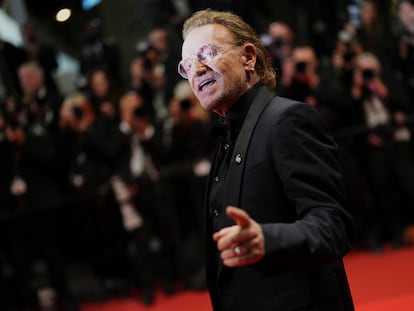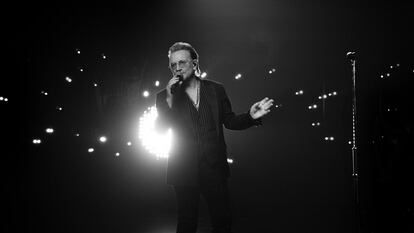Bono narrates his life (and his traumas) in a monologue. It’s all intense, just like him
In the documentary ‘Bono: Stories of Surrender,’ the U2 frontman talks about his late mother and the distant relationship with his father as well as his experience of stardom and activism. While it doesn’t dispel his messianic image, it does help understand it
It is worth remembering today that, between the 1980s and the 1990s, U2 was probably the biggest rock band in the world — the one that moved crowds on endless tours, the one that sprung surprises on us with its innovative musical and scenic approach. The Irish group peaked a long time ago, but they remain active (their last tour was in 2019, but nobody said it would be their last) albeit without the same impact.
Bono insists that U2 never had a leader, that the four of them were equal, but the truth is he was perceived as the leader, not only because he is the frontman, but because of his involvement in multiple humanitarian causes, from hunger to AIDS to the war in Bosnia and the debt of the Global South. He was seen meeting with George W. Bush and Tony Blair, giving speeches at the Davos Forum, in the U.S. Congress and in the European People’s Party. For many, his do-gooder activism became burdensome, too intense. It seemed he always had a sermon to deliver, but he has something to say about that.
Born Paul David Hewson in Dublin, the 65-year-old rock legend begins the documentary Bono: Stories of Surrender by admitting that autobiography is the domain of egomaniacs. A complicated heart operation in 2016 led him to review his life, a process that resulted in a memoir released in 2022, Surrender. First there was a stage version with which he toured; then came the album Songs of Surrender, in which he reinterprets his songs; and now we have the documentary that has premiered on Apple TV+. Bono uses the word ‘surrender’ to refer both to the white flag that was the band’s peace symbol and to his personal evolution from impulsive young man to committed adult.
Directed by Andrew Dominik, the documentary is an adaptation, in strict black and white, of the show that was seen in theaters, although some parts were recorded with an audience and others without. Bono appears on stage with little company: cellist Kate Ellis and harpist and keyboardist Gemma Doherty, both in the background with musical director Jacknife Lee. The entire footage is a long introspective monologue only interrupted by minimalist versions of some of his best songs. The confession moves through different phases: at first it seems like a poetic recital; at times it sounds like a self-help manual or a TED talk; some fragments come across as phony, while others exude more sincerity. He improves as he incorporates humor and, above all, as he gets emotionally naked and lets himself be seen as someone vulnerable instead of as a winner.
The singer talks at length about the traumas of his youth, the main one being his relationship with his father. At the age of 14, he lost his mother, Iris Hewson; his father Bob reacted by forbidding her name to be mentioned in the house. The teenaged Paul found that silence hard to bear, and when it was his turn to be a father, he felt insecure because he thought he had been a bad son. He learned to sing as a teen, taking his lead from his father, who was an amateur tenor. But he reproaches him for not believing in his talent. He simulates dialogues with Bob’s ghost, because Bob died in 2001. The whole monologue seems focused on staging a reconciliation.
The documentary picks up pace when it comes to the formation of U2. These were four boys who did not know how to play instruments properly but came together and were smart about finding their own way: doing what nobody else was doing. After four albums, each of which compounded their success, Bob Geldof’s Live Aid concert ensured legendary status. Bono does not complain at any time about the weight of fame. There is something selfish about wanting to be the best at what you do, he admits, which again flags up his self-esteem. He says his wife, Ali Hewson, was the person who kept his feet on the ground.
Bono alludes at some point to spirituality, although in a vague way. The son of a Catholic father and a Protestant mother, he feels a religiosity that is evident in his work without adhering to a specific creed. He is more convincing when he tries to explain his activism; he is aware that a millionaire talking so much about poverty can be understood as pure posturing. “Am I a hypocrite?” he asks. “Yes, but for many other reasons.” He adds that hypocrites can also do good deeds: “Motives don’t matter, results do, lives do.”
This documentary does not serve to deny Bono’s messianic persona. He found a vital mission: to harness fame to advance the causes he believes in. He has wanted to take stock now that he is no longer the star he once was, and at some point, he seems to be giving a justification no one has asked for. He is like that. If you already found him annoying, this documentary is not going to change your mind. But you’ll understand him better. It’s easy to make fun of those who dream of changing the world, and it’s harder to answer the question of what you’re doing to make it better yourself.
Sign up for our weekly newsletter to get more English-language news coverage from EL PAÍS USA Edition
Tu suscripción se está usando en otro dispositivo
¿Quieres añadir otro usuario a tu suscripción?
Si continúas leyendo en este dispositivo, no se podrá leer en el otro.
FlechaTu suscripción se está usando en otro dispositivo y solo puedes acceder a EL PAÍS desde un dispositivo a la vez.
Si quieres compartir tu cuenta, cambia tu suscripción a la modalidad Premium, así podrás añadir otro usuario. Cada uno accederá con su propia cuenta de email, lo que os permitirá personalizar vuestra experiencia en EL PAÍS.
¿Tienes una suscripción de empresa? Accede aquí para contratar más cuentas.
En el caso de no saber quién está usando tu cuenta, te recomendamos cambiar tu contraseña aquí.
Si decides continuar compartiendo tu cuenta, este mensaje se mostrará en tu dispositivo y en el de la otra persona que está usando tu cuenta de forma indefinida, afectando a tu experiencia de lectura. Puedes consultar aquí los términos y condiciones de la suscripción digital.
More information

Bono: ‘We have to fight against this general feeling that the world is screwed’
Archived In
Últimas noticias
Most viewed
- Sinaloa Cartel war is taking its toll on Los Chapitos
- Oona Chaplin: ‘I told James Cameron that I was living in a treehouse and starting a permaculture project with a friend’
- Reinhard Genzel, Nobel laureate in physics: ‘One-minute videos will never give you the truth’
- Why the price of coffee has skyrocketed: from Brazilian plantations to specialty coffee houses
- Silver prices are going crazy: This is what’s fueling the rally











































